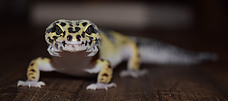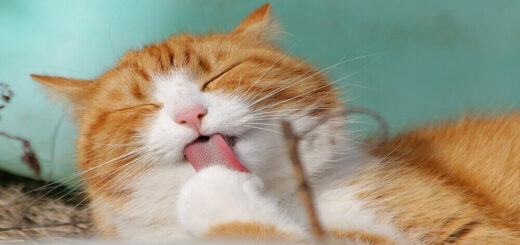What do leopard geckos eat?
If you’re thinking about getting a leopard gecko there are many important things to know about how to care of them, including what they eat. While very cute and fairly low maintenance these lizards require specialized care that is quite different from your pet cat or dog! Keeping them happy can be a work of art involving some trial and error just like any other pet!

Leopard Geckos are considered an exotic pet, and therefor, you will need to ensure you find a veterinarian in the area that is willing and able to provide routine and emergency care for your little friend, should it be needed. It is important to ask veterinary clinics if they cover this species specifically as many small animal clinics do not provide service for animals beyond the common house pets.
Water time!
Let’s start with the obvious – hydration! Your leopard gecko will need water available to drink. These guys are adorable but don’t just need the water for drinking – they will also regularly lay in the water to soak! That means having clean water available in a large enough dish to fit your whole lizard is very important for them. While they are reptiles, they still require a certain level of water quality so check with your local reptile experts to ensure you are treating your water properly if needed. The contents of tap water can vary by location so water treatment is not a one size fits all thing unfortunately.
Now for the Snacks!
Leopard geckos have a fairly focused diet – that includes primarily insects! Some species have a digestive system designed for fruits and vegetables, some digest meat well, omnivores can handle both, but these little guys thrive on a diet made of primarily of insects. “Insectivore” is the technical title for their dietary needs. Pretty cool that leopard geckos can thrive on some of the bugs we are usually looking to eliminate from the human living space such as crickets.
Such Cool Creatures!
Leopard geckos, with their striking appearance and unique personalities, have become popular pets among reptile enthusiasts. Ensuring their well-being involves understanding their dietary needs. In this comprehensive guide, we will delve into the fascinating realm of leopard gecko nutrition, exploring their natural diet, appropriate food choices, feeding schedules, and common misconceptions.
Understanding the Natural Diet of Leopard Geckos:
Leopard geckos are native to arid regions of Afghanistan, Pakistan, and India. In the wild, their diet consists mainly of insects such as crickets, mealworms, and locusts. Understanding their natural feeding habits provides crucial insights into creating a balanced and nutritious diet in captivity.
Staple Foods for Leopard Geckos:
In captivity, replicating the gecko’s natural diet is essential for their health and well-being. Staple foods include gut-loaded insects like crickets and mealworms, ensuring that the prey items are well-nourished before being consumed by the geckos. Additionally, calcium and vitamin supplements are vital to prevent nutritional deficiencies.
Treats and Variety in the Diet:
While staples form the core of their diet, providing variety is essential for overall health. Treats such as waxworms, silkworms, and roaches can be offered occasionally. Introducing diversity not only prevents dietary monotony but also provides a spectrum of nutrients essential for optimal gecko health.
The Importance of Gut Loading:
Gut loading involves feeding the insects a nutrient-rich diet before offering them to the leopard geckos. This ensures that the geckos receive a well-rounded nutritional profile. Various commercial gut-loading diets are available, or you can create your own by offering vegetables, fruits, and supplements to the feeder insects.
Feeding Schedule and Portion Control:
Establishing a consistent feeding schedule is crucial. Leopard geckos are crepuscular, meaning they are most active during dawn and dusk. Offering food during these times aligns with their natural feeding instincts. Portion control is equally important to prevent obesity and related health issues.
Common Misconceptions:
Dispelling myths around leopard gecko nutrition is vital for their well-being. Common misconceptions include the belief that they can thrive on a diet solely consisting of mealworms, neglecting the importance of calcium supplementation, and underestimating the need for fresh water, even though leopard geckos obtain most of their hydration from their food.
Conclusion:
Understanding what leopard geckos eat is fundamental to their care. By replicating their natural diet, providing a variety of nutritious foods, and embracing proper supplementation, you ensure the longevity and vitality of your leopard gecko companion. As responsible pet owners, it is our duty to prioritize their nutritional needs for a happy and healthy life.
FAQ:
Q1: Can I feed my leopard gecko only mealworms? A: While mealworms can be a part of their diet, relying solely on them may lead to nutritional deficiencies. It’s essential to provide a varied diet including other insects like crickets and supplements.
Q2: How often should I feed my leopard gecko? A: Feed adult leopard geckos 2-3 times a week and juveniles daily. Adjust the frequency based on their age, size, and individual needs.
Q3: Do leopard geckos need water? A: Yes, although leopard geckos obtain most of their hydration from their food, it’s essential to provide a shallow dish of fresh water in their enclosure.
Q4: Can I give my leopard gecko fruits and vegetables? A: While leopard geckos primarily consume insects, offering small amounts of safe fruits and vegetables occasionally can contribute to a diverse diet.
Q5: How do I know if my leopard gecko is getting enough calcium? A: Ensure that the insects are dusted with a calcium supplement before feeding. Signs of calcium deficiency include lethargy, tremors, and difficulty shedding.
By addressing these frequently asked questions, you’ll be better equipped to provide optimal care for your leopard gecko.
______________________________________________________________________
Have you ever had a leopard gecko? Let us know your experiences below!




